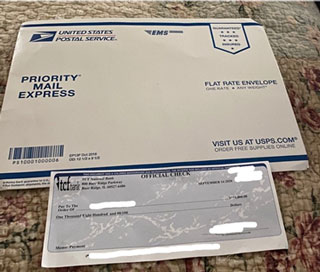FROM INFORMATION TECHNOLOGY SERVICES: How to spot fake work-at-home job offers

Package and check received by Southwest student after responding to suspicious work-at-home email offer.
As the COVID-19 pandemic continues, scams have emerged as millions of Americans grapple with job insecurity and loss.
The scams are fake work-at-home job offers that have left some Americans’ bank accounts drained of what funds they had left in the wake of the pandemic.
Southwest Information Technology Services recently quarantined an email that was sent to students under the guise of Navios Corporation out of New York. In it, the scammers promise “easy money” and “work from home”. Once the unsuspecting student clicks the link and enters their name and address, the scammers mail a check to purchase equipment to set up their home office. The check will not yield the funds. This is a fake offer and could potentially provide thieves unfettered access to your bank account.
A Southwest student clicked on the link, entered his information and received an $1,800 check in the mail in a wary looking envelope with no instructions. Thankfully, the student’s parent intercepted the suspicious communication and alerted Southwest officials. “I don’t want anyone else to become a victim of this fraud,” the parent said.
The Federal Trade Commission has a webpage dedicated to helping consumers spot fake offers and avoid being scammed. Check out the valuable tips online. You also may download the pdf to your phone or other device in case you receive suspicious offers in the future.
Chief Information Officer Michael Boyd advises: “A good rule of thumb: If it sounds too good to be true, it likely is.”
For more information on avoiding online scams, see the resources below.
Consumer Resources
Federal Trade Commission: “Work-at-Home Businesses”
ZipRecruiter Blog
The Balance Careers: “7 Ways to Protect Yourself From Work-at-Home Scams”
In This Issue...
- FROM THE PRESIDENT: Where education, training and business merge
- FACULTY NEWS: President Hall asks faculty to help TN Reconnect students keep moving forward
- President’s Leadership Retreat focuses on reimagining student success
- Southwest convenes first virtual legislative town hall
- STUDENT NEWS: New AFA program nets four Memphis Ostrander awards
- STUDENT NEWS: Honors Convocation salutes perseverance during pandemic
- STUDENT NEWS: Project M.O.S.T. takes students on virtual trip to Africa
- STUDENT NEWS: Southwest launches National Society of Leadership and Success chapter
- Welcome aboard, new team members
- STAFF KUDOS: Chief L. Angela Webb appointed to international committee for campus public safety
- STAFF KUDOS: Dr. Mary Palmer touts benefits of outdoor learning in Science and Education article
- FACULTY NEWS: Join the Academic Master Plan conversation in October
- FACULTY NEWS: Southwest rolls out faculty externship program
- FACULTY KUDOS: Dr. Eddie Baker appointed chair of business and technologies department
- FACULTY KUDOS: Cisco Networking Academy recognizes Brenda Phillips and Forrest Smith as top level instructors
- Adjunct Appreciation Awards go virtual
- Faculty and Staff Awards reward attendees with spectacular multi-media program
- Fall Convocation features student poetry and budget outlook
- Center for Access awarded $50,000 SERS grant; plans autism camp
- Virtual Data & Equity Conference offers insights on equity inside and outside the classroom
- Reimagine Southwest online!
- Want to help Reimagine Southwest? Join a governance council!
- Mandatory annual Title IX training begins Oct. 12
- ITS launches security awareness campaign; mandatory training to come
- College officials mobilize to promote health and safety in wake of COVID-19 cases
- Local health department impressed with campus safety measures
- Southwest launches COVID-19 activity dashboard
- ‘Tis the season for a flu shot
- FROM INFORMATION TECHNOLOGY SERVICES: How to spot fake work-at-home job offers
- SPECIAL TO SCOOP: Avoid COVID-19 phishing scams
- SALUQI CORNER: Student-athletes score big at TCCAA achievement awards
- Southwest: In the News